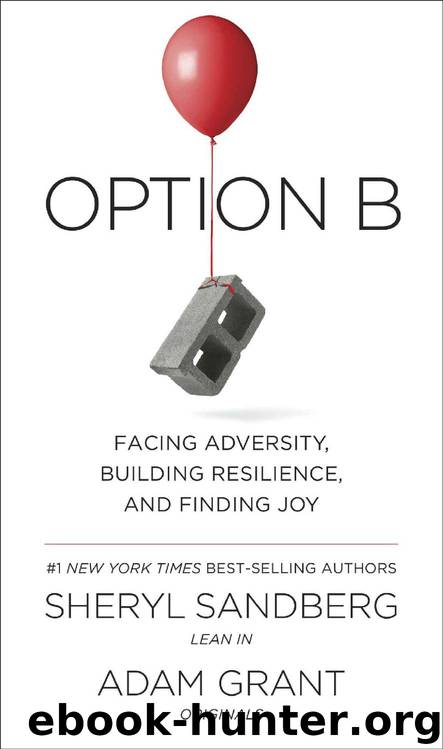Option B: Facing Adversity, Building Resilience, and Finding Joy by Sheryl Sandberg & Adam Grant

Author:Sheryl Sandberg & Adam Grant [Sandberg, Sheryl]
Language: eng
Format: epub, azw3
ISBN: 9781524732684
Publisher: Knopf Doubleday Publishing Group
Published: 2017-04-23T16:00:00+00:00
I wanted them to know that they should respect their feelings and not try to suppress them. We wrote together that it’s okay to be sad and they could take breaks from any activity to cry. That it’s okay to be angry and jealous of their friends and cousins who still had fathers. That it’s okay to say to anyone that they did not want to talk about it now. That they should know we did not deserve this. I wanted to make sure guilt did not cloud any moment when my kids could have a break from grief, so we agreed that it was okay to be happy and to laugh.
People often marvel at how resilient kids can be. There are neurological reasons for this: kids have more neural plasticity than adults, allowing their brains to adapt more easily in the face of stress. I learned from Carole that children have limits to how much intense emotion they can process at once. They have shorter “feeling spans”; their grief comes more in bursts than in sustained periods. Kids also sometimes express their grief through behavior changes and play rather than in words. As Carole told me to expect, my children cycled in and out of grief very quickly, sobbing one moment and then running off to play the next.
I realized sleep would be important to help us get through this. When I was a child, my parents always emphasized sleep, which I thought was no fun at all. Once I had my own children, I understood how right they were. When we’re tired, we’re physically and mentally weaker, more likely to be irritable, and we literally lack the energy to feel joy. Sleep matters even more in adversity because we need to marshal all our strength, so I stuck as close as I could to their regular bedtimes. When my kids had trouble falling asleep, I tried to teach them to count six breaths in and out, just as my mom had taught me.
Since our feelings were extremely raw, I knew we would make many mistakes, so forgiveness became a huge theme. The year before, my daughter and I had attended a Girls Leadership workshop and learned about “fast double-sorries”—when two people hurt each other’s feelings, you both apologize quickly so that you forgive each other and yourselves. Feeling deep grief and anger meant we all got upset much more easily, so we relied on this strategy a lot. When we lost control of our emotions, we would say we were sorry right away. Then we would “mirror” each other: the first person would explain what was upsetting, and the second person would repeat it back and apologize. We were trying to show that the other person’s feelings mattered to us. At one point, my daughter cried out, “I’m upset because both of you got more years with Daddy than I did.” My son and I acknowledged that it was unfair that she’d had the least time.
I tried to help my children be kind to themselves.
Download
Option B: Facing Adversity, Building Resilience, and Finding Joy by Sheryl Sandberg & Adam Grant.epub
Option B: Facing Adversity, Building Resilience, and Finding Joy by Sheryl Sandberg & Adam Grant.azw3
This site does not store any files on its server. We only index and link to content provided by other sites. Please contact the content providers to delete copyright contents if any and email us, we'll remove relevant links or contents immediately.
| Grief & Bereavement | Hospice Care |
| Pet Loss | Suicide |
They Both Die at the End by Adam Silvera(8611)
Thirteen Reasons Why by Jay Asher(7788)
The Space Between by Michelle L. Teichman(6088)
Suicide Notes by Michael Thomas Ford(4272)
Tuesdays with Morrie by Mitch Albom(3832)
Suicide: A Study in Sociology by Emile Durkheim(2609)
The Checklist Manifesto by Atul Gawande(2203)
Tuesdays With Morrie by Mitch Albom(2172)
Robin by Dave Itzkoff(2005)
In the Woods by Tana French(1996)
Bossypants by Tina Fey(1987)
No Ashes in the Fire by Darnell L Moore(1981)
Reservoir 13 by Jon McGregor(1852)
End of Days by Sylvia Browne(1823)
Olive Kitteridge by Elizabeth Strout(1790)
Bus on Jaffa Road by Mike Kelly(1784)
All Things New by John Eldredge(1781)
Scar Tissue by Anthony Kiedis(1771)
No Time to Say Goodbye(1760)
